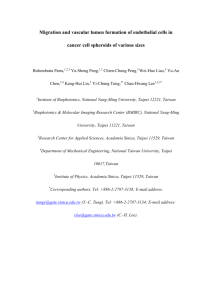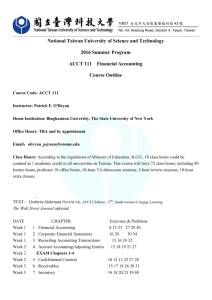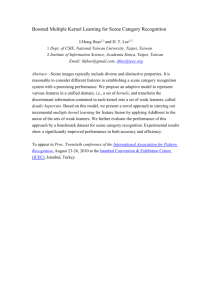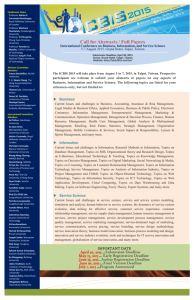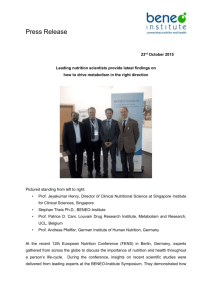glycaemic index in sport nutrition: metabolic responses and physical
advertisement
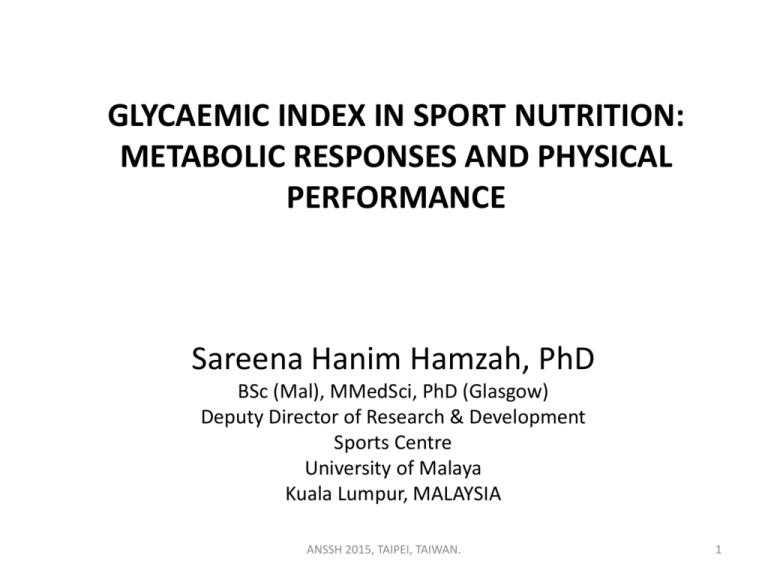
GLYCAEMIC INDEX IN SPORT NUTRITION: METABOLIC RESPONSES AND PHYSICAL PERFORMANCE Sareena Hanim Hamzah, PhD BSc (Mal), MMedSci, PhD (Glasgow) Deputy Director of Research & Development Sports Centre University of Malaya Kuala Lumpur, MALAYSIA ANSSH 2015, TAIPEI, TAIWAN. 1 Presentation Overview • Glycaemic Index and postprandial responses • Glycaemic Index in Sport Nutrition - Metabolic responses pre-, during and postexercise /recovery • GI and fuel storage • GI and performance in different type of exercise ANSSH 2015, TAIPEI, TAIWAN. 2 Glycaemic Index and postprandial responses • Glycemic index (GI) is a ranking of CHO foods based on their immediate effect on blood glucose levels (Jenkins et al. 1981) ANSSH 2015, TAIPEI, TAIWAN. 3 Glucose and insulin responses Similar responses were observed in plasma insulin concentration ANSSH 2015, TAIPEI, TAIWAN. 4 Suppression of lipolysis under condition of increased insulin concentration Adipocyte TAG (+ Insulin) – inhibit HSL (-) Lipolysis (+) Esterification Glycerol 3-P Glycerol FFA ATP Blood glucose CoA Fatty acyl CoA ANSSH 2015, TAIPEI, TAIWAN. (-)Blood Glycerol (-)Blood FFA - Reduced the uptake of fatty acids by muscle cells and thus diminished fat oxidation 5 Glycaemic Index in Sport Nutrition ANSSH 2015, TAIPEI, TAIWAN. 6 Glycaemic Index in Sport Nutrition What does the research say? Pre-exercise Pre-exercise meal (2g CHO/kg) with LGI consumed 2-3 hours prior exercise resulted - higher rate of fat oxidation - lower CHO utilisation - promote sustained CHO availability during exercise (Febbraio et. al., 2000; Wu et. al., 2003; Wee et. al., 2005) - better performance (Wu & William et. al., 2006) than HGI. These studies are in agreement with a recent study carried out on GI pre-exercise meal when consume 90 min prior to exercise. (Sun et. al., 2013) ANSSH 2015, TAIPEI, TAIWAN. 7 Glycaemic Index in Sport Nutrition GI CHO feeding before exercise 1. HGI • Higher blood glucose levels • Higher insulin levels • Higher suppression of plasma free fatty acids • Lower rate of fat oxidation • Higher rate of CHO oxidation • Higher glycogenolysis Wu et al 2003, Wu & Williams 2006 Wee et al 2005 Stevenson et al 2005 Mondazzi & Arcelli 2009 Sun et al. 2013 2. LGI • Lower blood glucose levels • Lower insulin levels • Lower suppression of plasma free fatty acids • Higher rate of fat oxidation • Lower rate of CHO oxidation • Glycogen sparing & extended availability of glucose sources Greater endurance capacity ANSSH 2015, TAIPEI, TAIWAN. 8 Glycaemic Index in Sport Nutrition however…. • 10 male cyclist consumed HGI or LGI meals (1g CHO/kg) 45 min before performing 40 km TT ANSSH 2015, TAIPEI, TAIWAN. 9 Findings • Higher CHO oxidation in LGI • Lower fat oxidation in LGI • No difference in FFA levels between HGI & LGI LGI meal increase availability of CHO and greater CHO oxidation throughout exercise and improved TT ANSSH 2015, TAIPEI, TAIWAN. 10 Glycaemic Index in Sport Nutrition 40 km TT - Greater CHO availability ANSSH 2015, TAIPEI, TAIWAN. 11 Glycaemic Index in Sport Nutrition What does the research say? During exercise Effect of pre-exercise glycemic-index meal on running when CHO-electrolyte solution is consumed during exercise. Wong et. al., 2009. Int J Sport Nutr Exerc Metab. 19(3):222-42 • 9 men run at 70% VO2max for 21 km on a treadmill after consuming HGI or LGI CHO (1.5 g/kg) meal 2 h prior or after overnight fast • During trial, 2 ml/kg of a 6.6% CHO-electrolyte solution immediately before exercise and every 2.5 km after the start of running. Findings :-There were no differences in total CHO and fat oxidation throughout the trials. When a CHO-electrolyte solution is consumed during a 21-km run, the GI of the pre-exercise CHO meal makes no difference in running performance. ANSSH 2015, TAIPEI, TAIWAN. 12 Glycaemic Index in Sport Nutrition What does the research say? Post-exercise and recovery • High CHO with HGI diet consumed over a recovery period of 24 hours resulted a greater increase in muscle glycogen storage than in the isocaloric LGI diet. (Burke et. al., 1993) • The greater accumulation of muscle glycogen following the HGI diet was a result of the greater insulinemic response favouring muscle glycogen resynthesis (Burke et al., 1993; Stevenson et. al., 2005) ANSSH 2015, TAIPEI, TAIWAN. 13 Glycaemic Index in Sport Nutrition Post-exercise and recovery • When GI foods were consumed during 24 h recovery between bouts of prolonged strenuous exercise, fat oxidation rates and FFA concentrations were higher following the LGI during subsequent exercise than in the HGI diet and therefore increased endurance capacity. (Stevenson et. al., 2005). ANSSH 2015, TAIPEI, TAIWAN. 14 Glycaemic Index and Fuel Storage Effect of high and low glycaemic index recovery diets on intramuscular lipid oxidation during aerobic exercise. Trenell et. al., 2008. British Journal of Nutrition, 99, 326-332. 7 endurance-trained, cycled 90 min at 70 % VO2peak, consumed either HGI or LGI meals (8 g CHO/kg) over the following 12 h. Findings The following day after an overnight fast, the 90 min cycle was repeated. -Reduce FFA availability was reduced in the HGI trial IMTG content of the vastus lateralis was quantified using magnetic resonance spectroscopy before and after exercise. ->2-fold greater reduction in IMTG in the HGI trial than the LGI trial HGI reduces FFA availability during exercise and increase reliance on IMTG as a substrate source during moderate intensity exercise ANSSH 2015, TAIPEI, TAIWAN. 15 Glycaemic Index and Fuel Storage • HGI increase glycogen synthesis – glycogen storage - insulin-independent (short recovery) • mediated by GLUT4 • low glycogen concentration, glycogen synthase - insulin-dependant - depending on timing of intake • LGI increase IMTG storage - high CHO recovery diet reduces the post-exercise resynthesis of IMTG (Decombaz et al., 2001) - LGI diet may favour IMTG resynthesis over a HGI diet but results have been inconsistent. * Substrate utilization influenced by pre-exercise muscle substrate level. ANSSH 2015, TAIPEI, TAIWAN. 16 GI and high intensity intermittent exercise • 10 males 4 females • Back-to-back 90 min intermittent high intensity treadmill running separated by 3 h • HGI & LGI consumed 2 h before and within 1 hr after Results A LGI improved the metabolic profile before and during extended high intensity intermittent exercise. Did not effect performance ANSSH 2015, TAIPEI, TAIWAN. 17 GI and high intensity intermittent exercise Effects of GI meals on intermittent exercise. Hulton et. al., 2012. Int J Sports Med; 33(9):756-62 • 9 male recreational football players • Performed a football specific protocol followed by 1 km TT • HGI & LGI meals was consumed 3.5 h prior Results • No significant impact on performance or metabolic responses during 90 min of intermittent high intensity exercise ANSSH 2015, TAIPEI, TAIWAN. 18 Conclusions 1. LGI pre-exercise meal enhances fat utilization during endurance exercise than HGI but may not translate into performance 2. HGI meal consumed during recovery promotes higher glycogen synthesis and storage compared to LGI. Higher glycogen storage increases glycogenolysis. 3. LGI meal consumed during recovery between bouts of prolonged exercise increases free fatty acid and rate of fat oxidation during subsequent exercise than HGI 4. LGI increases IMTG storage, HGI reduces FFA availability and increases IMTG utilization. 5. GI of CHO pre-exercise meals may not benefit high intensity intermittent exercise. 6. GI of CHO consumed during exercise? SHOULD GI TO BE CONSIDERED IN SPORT NUTRITION? I WELCOME FOR ANY SUGGESTION AND OPINION ANSSH 2015, TAIPEI, TAIWAN. 19 References Burke, L. M., Collier, G. R., & Hargreaves, M. (1993). Muscle Glycogen-Storage After Prolonged Exercise - Effect of the Glycaemic Index of Carbohydrate Feedings. Journal of Applied Physiology, 75, 1019-1023. Decombaz, J., Schmitt, B., Ith, M., Decarli, B. H., Diem, P., Kreis, R., Hoppeler, H., & Boesch, C. (2001). Post-exercise fat intake repletes intramyocellular lipids but no faster in trained than in sedentary subjects. American Journal of Physiology-Regulatory Integrative and Comparative Physiology, 281, R760-R769. Jenkins, D. J. A., Wolever, T. M. S., Taylor, R. H., Barker, H., Fielden, H., Baldwin, J. M., Bowling, A. C., Newman, H. C., Jenkins, A. L., & Goff, D. V. (1981). Glycaemic Index of Foods - A Physiological-Basis for Carbohydrate Exchange. American Journal of Clinical Nutrition, 34, 362-366. Stevenson, E., Williams, C., McComb, G., & Oram, C. (2005b). Improved recovery from prolonged exercise following the consumption of low glycaemic index carbohydrate meals. International Journal of Sport Nutrition and Exercise Metabolism, 15, 333-349. Trenell, M. I., Stevenson, E., Stockmann, K., & Brand-Miller, J. (2008). Effect of high and low glycaemic index recovery diets on intramuscular lipid oxidation during aerobic exercise. British Journal of Nutrition, 99, 326-332. Wee, S. L., Williams, C., Tsintzas, K., & Boobis, L. (2005). Ingestion of a high-glycaemic index meal increases muscle glycogen storage at rest but augments its utilization during subsequent exercise. Journal of Applied Physiology, 99, 707-714. Wu, C. L. & Williams, C. (2006). A low glycaemic index meal before exercise improves endurance running capacity in men. International Journal of Sport Nutrition and Exercise Metabolism, 16, 510-527. Wu, C. L., Nicholas, C., Williams, C., Took, A., & Hardy, L. (2003). The influence of high-carbohydrate meals with different glycaemic indices on substrate utilisation during subsequent exercise. British Journal of Nutrition, 90, 1049-1056. ANSSH 2015, TAIPEI, TAIWAN. 20

